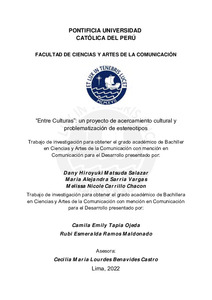| dc.contributor.advisor | Benavides Castro, Cecilia Maria Lourdes | |
| dc.contributor.author | Matsuda Salazar, Dany Hiroyuki | |
| dc.contributor.author | Sarria Vargas, Maria Alejandra | |
| dc.contributor.author | Carrillo Chacon, Melissa Nicole | |
| dc.contributor.author | Tapia Ojeda, Camila Emily | |
| dc.contributor.author | Ramos Maldonado, Rubi Esmeralda | |
| dc.date.accessioned | 2023-05-09T16:25:43Z | |
| dc.date.available | 2023-05-09T16:25:43Z | |
| dc.date.created | 2022 | |
| dc.date.issued | 2023-05-09 | |
| dc.identifier.uri | http://hdl.handle.net/20.500.12404/24928 | |
| dc.description.abstract | Con la creciente migración venezolana al Perú, este se ha convertido en el segundo
país con la mayor cantidad de refugiados de esta comunidad, de los cuales el 75% reside en la
capital. Con el fin de contribuir a una convivencia pacífica entre ambas comunidades, peruana
y venezolana, el presente proyecto tiene como objetivo promover el conocimiento de la realidad
del migrante venezolano para el acercamiento cultural libre de estereotipos entre ambas
comunidades residentes en la urbanización Los Rosales de Pro en el distrito de Los Olivos.
Basándose en la estrategia del pilar de integración según la OIM, específicamente la integración
cultural y cohesión social, “Entre culturas” propone esto mediante 3 componentes secuenciales:
el conocimiento sobre la realidad del migrante venezolano, el reconocimiento y
problematización de estereotipos y, finalmente, la integración mediante actividades en
conjunto. Para la implementación del piloto, el proyecto trabaja los primeros dos componentes
mencionados y logra que 5 de los 6 participantes cambien su percepción sobre los venezolanos
a una más empática y positiva, mientras que el 100% afirma reconocer que la realidad del
migrante es compleja y retadora. Asimismo, 4 de 6 participantes identifican como origen de
sus estereotipos la opinión externa de amigos/familiares y el discurso negativo sobre
venezolanos en medios de comunicación. En suma, el proyecto evidencia tener un impacto
positivo en la problematización de las consecuencias de los estereotipos sobre la comunidad
venezolana y por ende contribuye a un mayor acercamiento entre culturas. | es_ES |
| dc.description.abstract | Due to the growing migration process from Venezuelans to Perú, this has become
the second nation with the most refugees from this community; of which 75% resides in its
capital. Looking forward to a more peaceful coexistence between both communities, Peruvians
and Venezuelans, this project aims to promote knowledge about the reality of migrants and
hardships to achieve a cultural approachment free of stereotypes between both communities
that reside in the urbanization Los Rosales de Pro in Los Olivos district in Lima. Based on the
integration pilar strategy proposed by the IOM, more specifically cultural integration and social
cohesion, “Entre culturas” follows 3 consecutive components: Knowledge about the reality of
Venezuelan migrants, the recognition and elimination of stereotypes and finally the integration
through joint activities. For the pilot, the project works through the first two named components
and achieves 5 out of the 6 participants claiming that their perceptions about migrants have
changed to a more empathic and positive view. Furthermore, 100% of the participants claim to
recognize that the reality of migrants is complex and challenging. Also, 4 out of the 6
participants identify their stereotypes origins as caused by external opinions from friends and
family, as well as the negative narrative portrayed in the media. In conclusion, this project has
proven to have a positive impact on the elimination of stereotypes on the Venezuelan migrant
community and therefore contributes to a greater approach between cultures. | es_ES |
| dc.language.iso | spa | es_ES |
| dc.publisher | Pontificia Universidad Católica del Perú | es_ES |
| dc.rights | info:eu-repo/semantics/openAccess | es_ES |
| dc.rights.uri | http://creativecommons.org/licenses/by/2.5/pe/ | * |
| dc.subject | Inmigrantes--Venezuela | es_ES |
| dc.subject | Estereotipo | es_ES |
| dc.subject | Gestión cultural--Perú--Los Olivos (Lima : Distrito) | es_ES |
| dc.title | “Entre Culturas”: un proyecto de acercamiento cultural y problematización de estereotipos | es_ES |
| dc.type | info:eu-repo/semantics/bachelorThesis | es_ES |
| thesis.degree.name | Bachiller en Ciencias y Artes de la Comunicación con mención en Comunicación para el Desarrollo | es_ES |
| thesis.degree.level | Bachillerato | es_ES |
| thesis.degree.grantor | Pontificia Universidad Católica del Perú. Facultad de Ciencias y Artes de la Comunicación | es_ES |
| thesis.degree.discipline | Ciencias y Artes de la Comunicación con mención en Comunicación para el Desarrollo | es_ES |
| renati.advisor.dni | 44251992 | |
| renati.advisor.orcid | https://orcid.org/0000-0003-2687-5019 | es_ES |
| renati.author.dni | 46391536 | |
| renati.author.dni | 73267717 | |
| renati.author.dni | 71888739 | |
| renati.author.dni | 73042598 | |
| renati.author.dni | 72980836 | |
| renati.discipline | 322186 | es_ES |
| renati.level | https://purl.org/pe-repo/renati/level#bachiller | es_ES |
| renati.type | https://purl.org/pe-repo/renati/type#trabajoDeInvestigacion | es_ES |
| dc.publisher.country | PE | es_ES |
| dc.subject.ocde | https://purl.org/pe-repo/ocde/ford#5.08.00 | es_ES |






